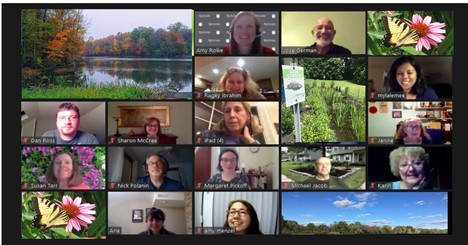Clare worked with the Borough of Middlesex Public Library to teach children about the life cycle of the Monarch butterfly and established a native plant garden that included milkweed and nectar plants. Tim created a Natural Resource Inventory for the Borough of Collingswood in order to guide any potential land use and environmental decisions and to serve as a resource for the borough’s Master Plan. Maureen worked with the Green Committee for the Somerset County Park Commission to evaluate whether signage and lids on waste containers would help reduce recycling contamination. These are just a few examples of what Rutgers Environmental Stewards have done in their respective communities.
Rutgers Cooperative Extension is offering its 2021 online Rutgers Environmental Stewards class, which educates volunteers about current environmental issues so they can help tackle environmental problems in their communities.
The program is designed for anyone who wants to learn about the science underlying key environmental issues in New Jersey. University experts are joined by colleagues from government and the non-profit sector who provide a crash course in New Jersey environmental protection. Topics covered include climate change, solid waste and recycling, soil health, energy conservation, water resource protection, land use policy, wildlife ecology and habitat conservation, among others.
In order to become a Certified Rutgers Environmental Steward, participants must complete a 60-hour internship of their choosing. The internship exposes the stewards to real-world environmental issues in their communities.
“Students learn about contemporary environmental issues from a panel of experts and also obtain the tools to make a difference in the community,” said program coordinator Amy Rowe, county agent with Rutgers Cooperative Extension. The program includes discussion, engaging activities and a volunteer project chosen by the participant.
The five-month program is offered as a statewide, online class featuring regional discussions with a local coordinator. The class will be held from 5-8 p.m. on Tuesday evenings starting January 26 and will run through June 1. Classes will convene as a group from 5-7 p.m. with a content expert who will cover that week’s topic. From 7-8 p.m., classes will break out into regions for the last hour to cover local issues and meet with their coordinator for further discussion and activities.
More information about the class and registration can be found on the website. For questions, contact the regional coordinator.
Region 1 – Hudson, Bergen, Essex, Passaic, Morris, and Sussex counties. Coordinator: Amy Rowe, rowe@njaes.rutgers.edu, 908-235-1168.
Region 2 – Union, Middlesex, Somerset, and Monmouth counties. Coordinator: Michele Bakacs, mbakacs@njaes.rutgers.edu, 732-398-5274.
Region 3 – Mercer, Hunterdon, and Warren counties. Coordinator: Margaret Pickoff, mpickoff@mercercounty.org, 609-989-6830.
Region 4 – Burlington, Camden, Gloucester, Salem counties. Coordinator: Mike Haberland, mike.haberland@rutgers.edu, 856-216-7130, ext 3.
Region 5 – Atlantic, Ocean, Cape May, and Cumberland counties. Coordinator: Amy Menzel, amenzel@acua.com, 609-272-6934.


